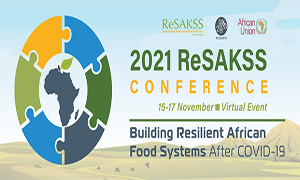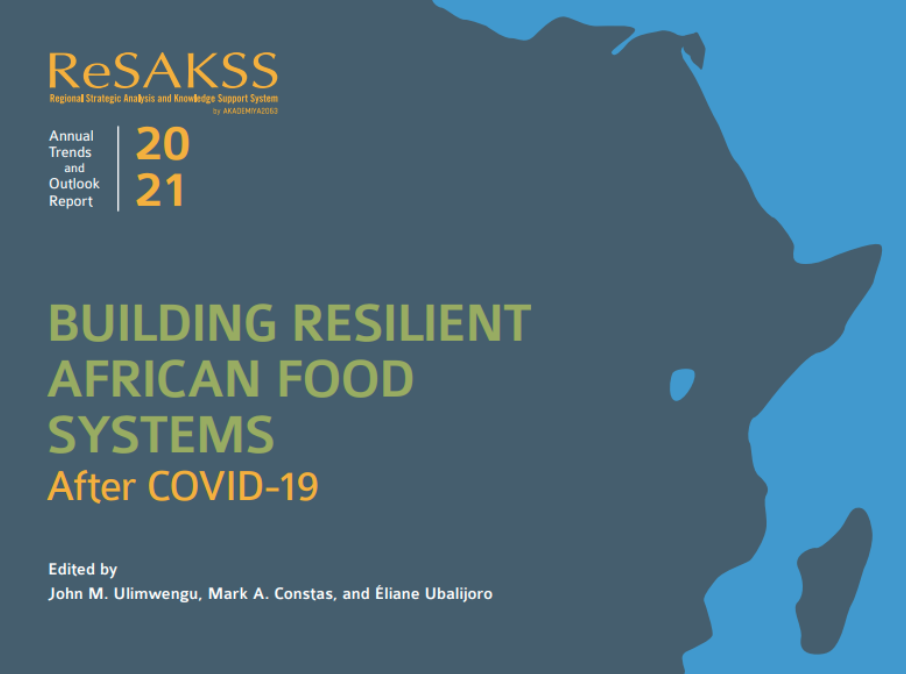15-17 November 2021. AKADEMIYA2063, in partnership with AUC, convened a virtual 2021 ReSAKSS Annual Conference to promote review and dialogue on the impacts of the COVID-19 pandemic on African food systems and policy options to ensure recovery and strengthen resilience to future shocks.
- List of speakers
- Agenda
- Article 22/12 Building Resilient African Food Systems After COVID-19 – Lessons from the ReSAKSS 2021 Annual Trends and Outlook Report
Featuring five plenaries and five panel sessions, with over 23 organizations in attendance, the conference provided a forum to discuss research evidence and recommendations presented in the 2021 ATOR.
The report assesses the impacts of COVID-19 on Africa’s food systems, examines the responses of African governments to the crisis, in particular their expansion of social protection programs to mitigate negative impacts on households, and equally discusses tools, methodologies and approaches to measure the impacts of COVID-19 and similar crises and to assess the resilience of individuals, communities, and countries.
“The COVID-19 pandemic has posed unprecedented challenges to health, economic and agrifood systems around the globe, causing severe disruptions to African economies and food systems; it has interrupted the longest period of sustained economic growth in the continent’s history. Building resilient African food systems is one of the seven commitments of the 2014 Malabo Declaration. It calls for a broad perspective on food systems resilience that takes into account implications for and actions by all food systems actors. The 2021 Annual Trends and Outlook Report (ATOR) presents a body of research-based evidence to facilitate understanding of the pandemic’s effects and support the design of post-COVID-19 recovery measures that strengthen the resilience of African food systems,” Dr. Ousmane Badiane, AKADEMIYA2063 Executive Chair.
The 2021 ReSAKSS Conference shared required policies and actions to accelerate Africa’s recovery from the effects of the COVID-19 pandemic, preparedness for future shocks and potential solutions to challenges related to measuring the impacts of and resilience to complex shocks. The event was attended by high-level policy leaders (https://bit.ly/3cfuFFe), including H.E. Josefa Leonel Correia Sacko, AU Commissioner, Department of Agriculture, Rural Development, Blue Economy and Sustainable Development (AUC-DARBE).
- 15/10: The conference was officially opened on Day 1 and featured an overview presentation of the 2021 ATOR, a keynote presentation on impacts of and responses to COVID-19 in African countries, presentations of key chapters, and panel and plenary discussions on the conference theme
- 16/10: Day 2 focused on presentations and panel and plenary discussions of the different chapters of the 2021 ATOR.
- 17/10: Day 3 concluded the conference with presentations and panel and plenary discussions on progress in achieving CAADP goals and targets and progress and next steps in the 2021 CAADP Biennial Review process.
Plenary Session I– Opening Session of the 2021 ReSAKSS Conference
- Moderator: Professor Sheryl Hendriks, Department Head, Agricultural Economics, Extension and Rural Development, University of Pretoria P
- Dr. Ismahane Elouafi, Chief Scientist, Food and Agriculture Organization of the United Nations (FAO) Dr. Godfrey Bahiigwa, Director, Department of Agriculture, Rural Development, the Blue Economy and Sustainable Environment, African Union Commission (AUC)
- Dr. Martin Fregene, Director, Agriculture and Agro-Industry, African Development Bank (AfDB)



No comments:
Post a Comment